High Fidelity: the São Paulo Forum
How the São Paulo Forum is directly responsible for impoverishing Latin America through socialist policies.
Welcome Avatar! Now that Nicolas Maduro refuses to step down or show the votes to confirm his claims for winning the elections in Venezuela, it is time to go over the one organization that has been at the root of much of Latin America’s left-wing misery with a slice of authoritarianism: the São Paulo Forum.
Few international media outlets ever discuss or mention the ideology platform that has interconnected most Latin American countries in the last 3+ decades. It is one of the main culprits for why Latin America remains the promise of “the future”, without ever actually becoming the future.
Let’s dig in.
Origins of the São Paulo Forum
This clique of leftist politicians started in 1989, when Fidel Castro suggested to the then Brazilian trade union leader and founder of the Workers' Party (PT), Luiz Inacio Lula da Silva, to establish an international seminar so that the continent's left could meet annually to discuss plans for Latin America.
In the early 1990s, the Cuban “revolution” was in trouble. The Berlin Wall had fallen and Soviet communism was collapsing.
Castro’s main political, economic, military and ideological support was crumbling and he urgently needed a project to make sure his communist island rule could survive the upcoming decades.
If Castroism has been clever at anything, it has been in seeking countries and structures to sustain itself, living off the support of others and financing the Cuban communist project of oppression. And this is exactly how the idea for the international forum came to be.
Lula was a popular union leader and a bastion of the left that Fidel defended. Castro did not have many other references in the region at this time, so it was urgent to "Latin Americanize" his project so it could continue to exist, no longer through satellites, but fully integrated in the region.
According to its founders, the Forum was created to bring together the efforts of left-wing and far-left parties and movements to "debate the international scenario" after the fall of the Berlin Wall and "the consequences of neoliberalism in the countries of Latin America and the Caribbean."
In practice, the Forum would do far more than just “debate”.
São Paulo, Brazil, July 1990
The São Paulo Forum was born with the support of the PT party of Brazil, which Lula presided over. It had a clear mission of forming a group that was silent in its action, but forceful in its purpose: to fill Latin America with leftist governments.
Lula da Silva ran for president in 1989, but lost in the second round. He went on to also lose two other presidential elections, both in 1994, and then in 1998.
So far, the Forum had not yet gotten hold of any country in the region. That is, until Hugo Chavez got elected in Venezuela in 1998.
Hugo Chávez in Venezuela: the first “success”
Fidel already knew that Hugo Chávez would be the perfect piece to start his project. In 1992, Chávez led the MBR-200 in its unsuccessful coup d'état against the Democratic Action government of President Carlos Andrés Pérez, for which he was imprisoned.
When Chávez was released from prison in 1994, his first international trip was to Cuba. He was received with honors even though his coup attempt had failed, and he gave a speech at the University of Havana. The rest is history.
In 1998, Hugo Chávez was elected with a government program called "A democratic revolution", based on discontent with the parties and the wear and tear of Venezuelan politics. Fidel had achieved his goal.
After several years of crisis, Cuba once again had a direct source of financing and a president subject to its designs. Cuba was no longer the one under its tutelage, but the one that was the tutelary.
The Latam Socialist Wave
From this moment onwards, left-wing governments in Latin America came to power:
2003: Lula in Brazil, Néstor Kirchner in Argentina
2005: Tabaré Vázquez in Uruguay
2006: Evo Morales in Bolivia, Michelle Bachelet in Chile
2007: Rafael Correa in Ecuador, Daniel Ortega in Nicaragua
2008: Fernando Lugo in Paraguay
They came to power with a “reformist and revolutionary” narrative, backed by a lot of Venezuelan oil money. Many more followed in years after: Cristina Kirchner, Mujica, Funes, Rousseff, Humala, Maduro, AMLO, etc.
To date, only 2 countries in the region have been spared from indirect São Paulo Forum rule: Costa Rica and Guatemala.

How does the São Paulo Forum operate in practice? Its success lies in its informality.
There is no major structure or hierarchy, just general coordination and a lot of iterations and policies. The Forum has an annual plenary meeting, and several events throughout the year and a work agenda.
One example of how policies end up being implemented is the Summit of the Americas in Mar del Plata in 2005. Here, the Forum presidents actively blocked a free trade initiative (ALCA) between the region and the United States.
The look on Bush’s face is an iconic moment of international politics: he couldn’t understand why countries would vote against their own interest of more trade and commerce.
The main mindset behind this resistance to trade was that the “imperialist” United States would benefit more and that South America would be better off trading between it’s own countries under the Mercosur.
How to Maintain Power
During their terms, many of the São Paulo Forum presidents implemented constitutional reforms, seized control of judicial systems and armed forces, implemented censorship and subsidized main stream media outlets, while at the same time trying to get more control over the economy and strategic companies.
One of the greatest successes from power was launching the TV channel Telesur in 2005. It represents a propaganda apparatus still in place, which is largely financed by the Venezuelan regime.

Other government bodies like the ALBA, Unasur and CELAC were also created to gain more control through interregional organizations.
Autist note: The Mercosur trading block between Argentina, Brazil, Paraguay and Uruguay predates the São Paulo Forum influence on a State level: it was created in 1991. In 2012 however, it did incorporate Venezuela as a full member, and in 2023 Bolivia. In terms of partial members it includes pretty much the whole of South America.
Through these organizations member states could go against the established order that could complicate indefinite re-elections and oversee democratic proceedings from another angle: the Organization of American States (OAS).
Another way to maintain its influence is precisely through what Yuri Bezmenov warns against in the video below: ideological subversion on many different levels.
“The main emphasis of the KGB is not in the area of intelligence at all. Only about 15% of time, money, and manpower is spent on espionage and such. The other 85% is a slow process which we call either ideological subversion or active measures… or psychological warfare.”
— Yuri Bezmenov
The São Paulo Forum has infiltrated universities, think tanks, and much more. The Marxist guerrillas of the 1970s who failed with weapons now use education institutions as artillery.
The agenda is clear and we still see this on a daily basis: participate in and promote all social protests in the region (in Argentina the government was directly funding these protestors), accompany electoral processes, raise “ecological” and “feminist” banners, etc. At each Forum summit, the issues are discussed and reviewed.
If you read the main points of the 2024 summit in Honduras, it is almost hard to believe that this is not part of some exaggerated Marxist parody:
It is essential to seek concrete unitary formulas that are capable of uniting the largest possible number of those affected by the actions of neoliberal capitalism, through collective debate and without hegemony. In this sense, it is essential to internalize once and for all the need for left-wing political parties and social and popular movements with ideas and commitments to their people to assume the broadest and most democratic unity of action possible.
Peace, environmental protection, development with social justice and the dignified future of the Latin American peoples and countries will depend on the unity and organization promoted by the left-wing and progressive forces of the continent to advance the emancipatory political, social and cultural mobilization of our peoples, jointly building integration, solidarity, cooperation and multilateralism.
Unfortunately, it is not parody.
Attending Forum members take these bullet points to heart, and the proof is in the crumbling pudding.
Results
The pudding has mainly been beneficial for the class of Cantillionaires in the best positions for eating it: politicians, bureaucrats, union leaders, high ranking social and popular movement members.
Some very clear patterns arise for the two countries that have embraced the Forum’s policies to their full extent: Argentina and Venezuela have been plagued by hyperinflation, and poverty rates have skyrocketed in both cases.
In the case of Forum founding father Lula’s home country Brazil, results have been more positive: its contribution to South American GDP increased, while smaller countries with a smaller population, industrial and agricultural base started lagging behind (except for Chile and Paraguay, two countries that have maintained a more open market mindset):
However when looking at poverty rates, not much has changed. In fact, the only country that actually improved its poverty rates is the one that was the least affected by the São Paulo Forum ideologies: Paraguay.
All other countries show increased poverty levels:
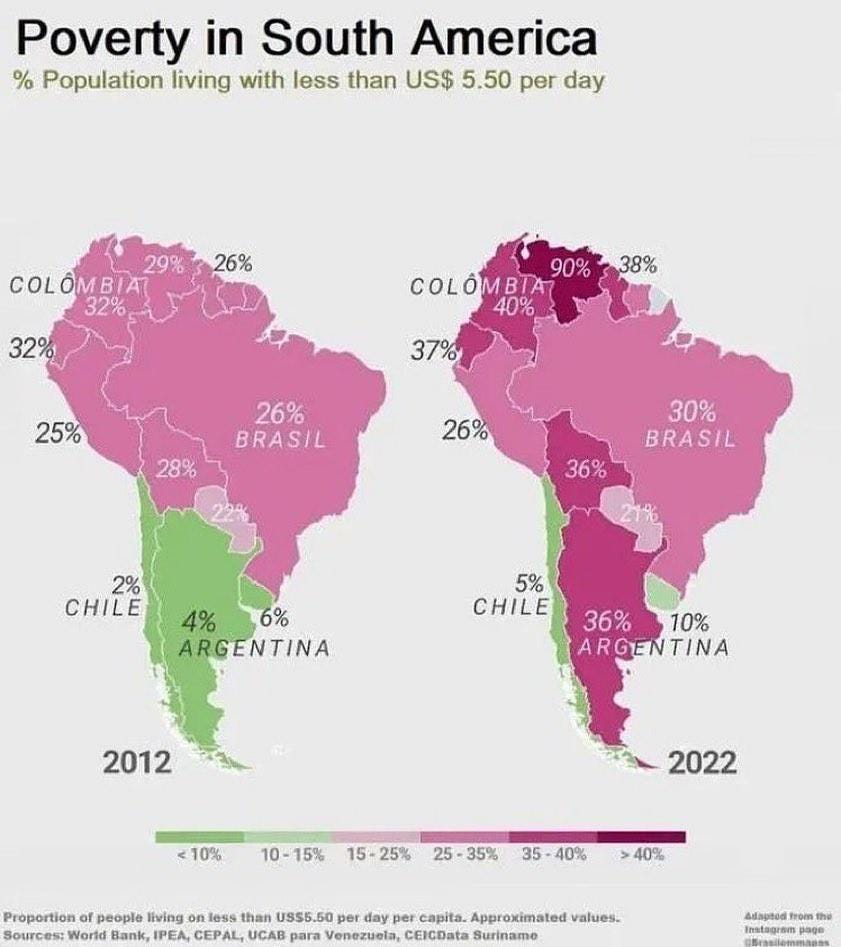
So all these Marxist Forum policies around “Social Justice” in practice did not move the needle when looking at it from a poverty rate perspective, in many cases it actually created more poverty. Total shocker.
Final Thoughts
Some analysts point out that the São Paulo Forum has never really managed to gain enough strength and importance to influence the region.
History tells us otherwise. The Venezuelan elections this week are a clear example of that: the most prominent Forum members (Brazil, Colombia and Mexico), abstained from voting at the OAS for Maduro to show the votes that back up his claims of having won the elections.
As soon as the heat turned up for Maduro in Venezuela after the population started protesting against his potential election fraud, he received military aid directly from the Forum’s cradle: at least 3 unscheduled flights took off from Cuba with Caracas as a final destination.
Of course politics and leadership have differed from country to country, but the most impactful policies — for good, but mainly for worse — have come from politicians that adhered to the São Paulo Forum or Grupo de Puebla (a rebranding attempt to improve the reputation of the SPF when AMLO got elected in Mexico).
The impact of policies has not been uniform across the region, and some countries have reached levels of destruction not seen in others — Venezuela and Argentina being the clearest of the former, whereas Brazil and Mexico would be more “stable” examples.
While AMLO in Mexico and Lula in Brazil have not directly attacked the private sector like the Kirchners in Argentina and Chávez/Maduro have in Venezuela, they have laid the ground work for fiscal deficits and potential future problems with social benefit programs if their population pyramids do not improve.
The Forum has had no problem aligning itself with criminal groups, for example the FARC in Colombia, because that has also been part of their financing and their dynamics. Record billion dollar corruption cases like Odebrecht (Lava Jato) in Brazil under Lula da Silva and Dilma Rousseff, interconnect the whole continent.
There is no right-wing or libertarian alternative in the region that even comes close to the influence of the São Paulo Forum. It is a thought-current that is omnipresent and picks up steam in terms of policies whenever a charismatic enough left-wing leader is voted into office.
As long as the São Paulo Forum’s “Social Justice” concepts keep resonating with a big enough part of the population, Latin America will remain the “promised land of the future”, without ever actually becoming it.
See you in the Jungle, anon!
Other ways to get in touch:
X/Twitter: definitely most active here, you can also find me on Instagram but I hardly use that account.
1x1 Consultations: book a 1x1 consultation for more information about obtaining residency, citizenship or investing in Argentina here.
Podcasts: You can find previous appearances on podcasts etc here.
WiFi Agency: My other (paid) blog on how to start a digital agency from A to Z.




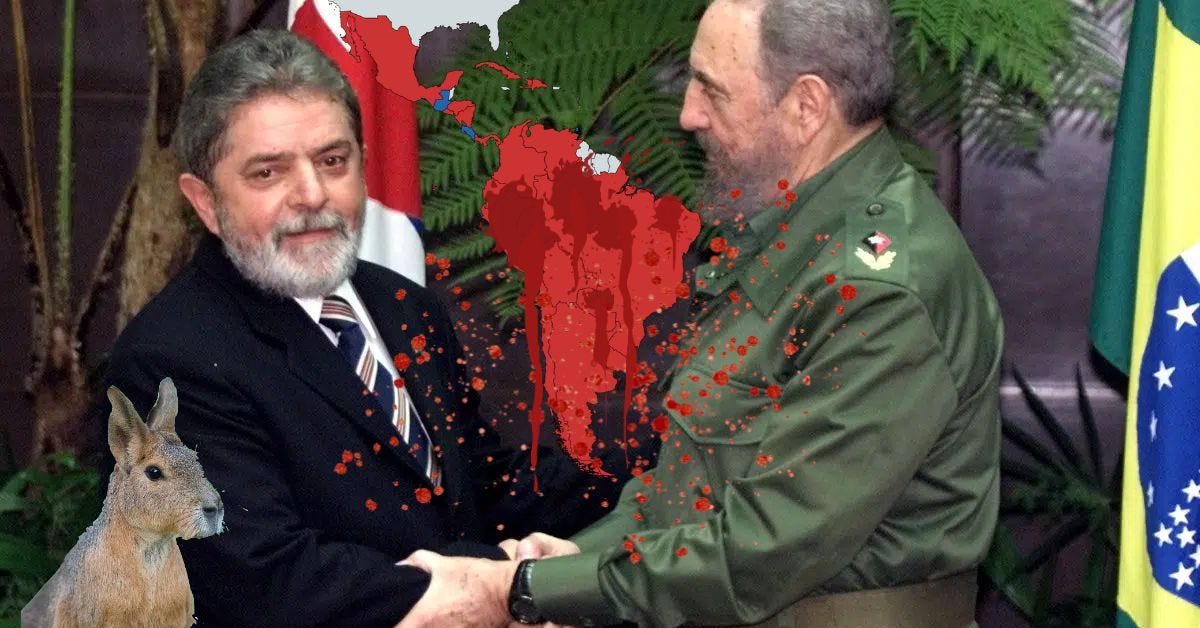

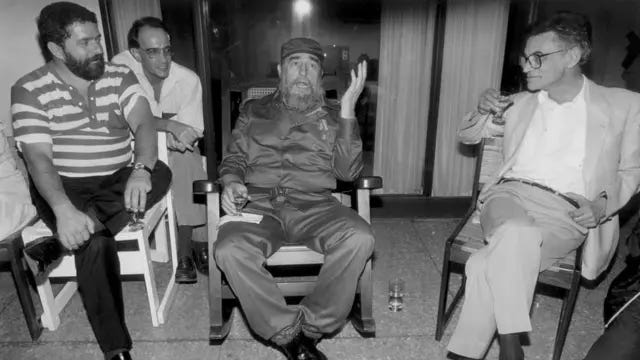
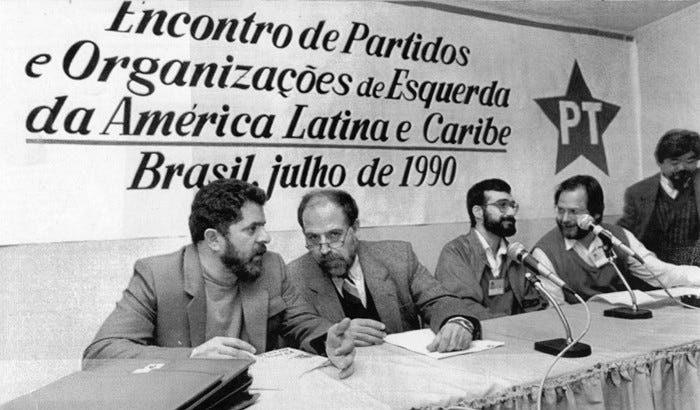


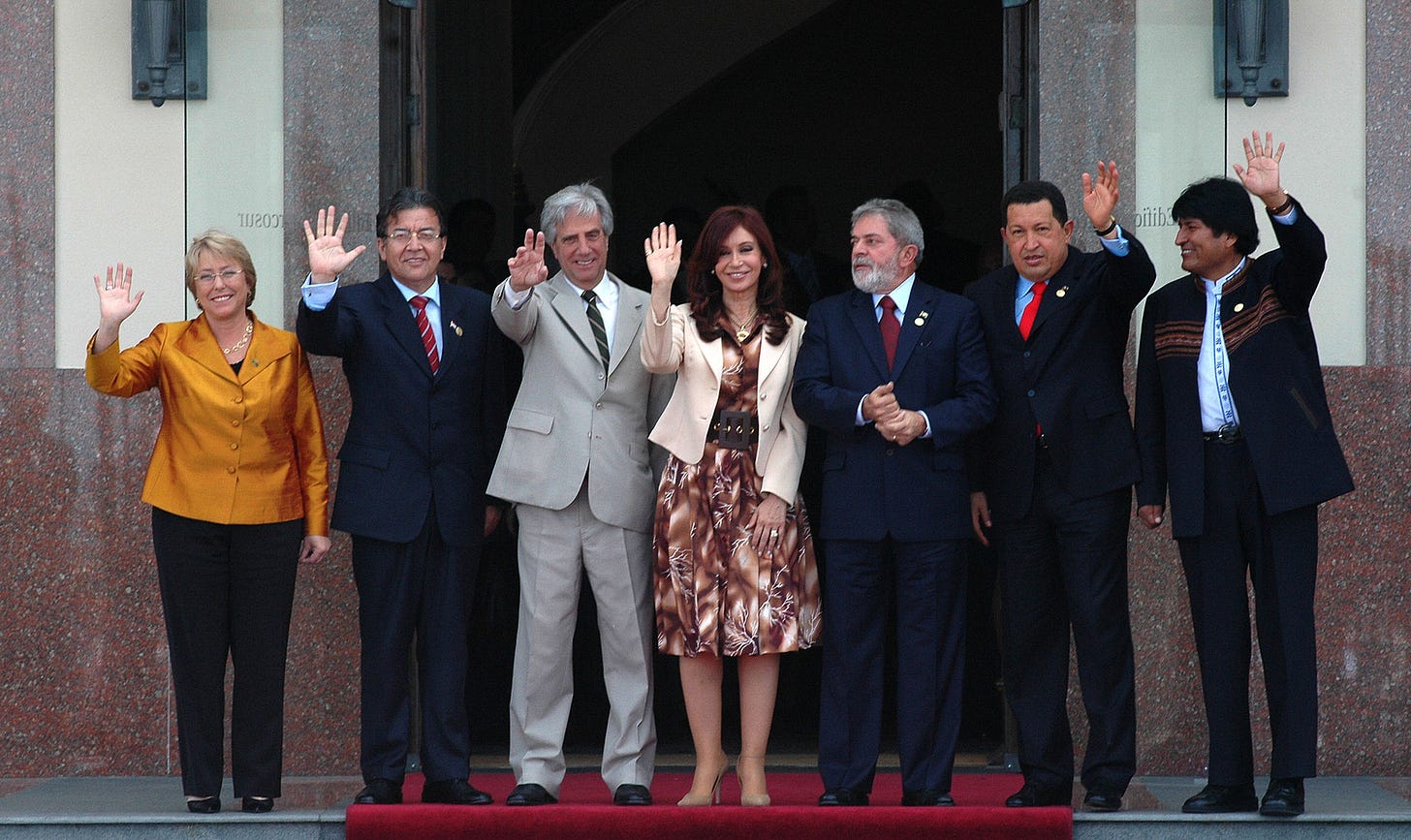
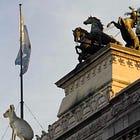


Such a bunch of parasitic turds
that picture of fidel and chavez made me unreasonably angry jajaja
great job covering these issues. most english-language coverage reduces el puto chavez to typical socialism when its castroism and corruption and other junk that makes me sad to be venezuelan.